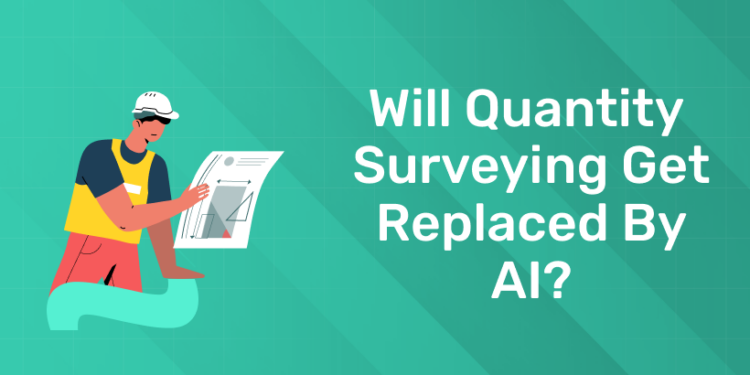Table of Contents
Artificial Intelligence (AI) is rapidly advancing over industries. It is a revolutionary field that creates computer systems that are capable of performing tasks that typically require human intelligence. AI has the potential to transform various industries and improve our daily lives. The downside is that humans are being replaced by AI across various fields. A question lingering on the mind of Quantity surveyors is ‘Will quantity surveying get replaced by AI?’. Let us delve into the details.
Quantity Surveyor online certification course on Entri app! Join Now!
What do Quantity Surveyors do?
Quantity surveyors prepare cost estimates for product manufacturing, construction projects, or services to help management in bidding or determining the price of a product or service. Some of the tasks they perform are:
- Review material and labor requirements. Based on this, they decide whether it is more cost-effective to produce or purchase components.
- Prepare cost and expenditure statements and other necessary documentation at regular intervals during the project.
- Liaise with clients, vendors, personnel in other departments to discuss and formulate estimates and resolve issues.
- plan, organize, and schedule work.
- maintain tendering process, and conduct negotiations.
- Visit site to record information about various factors to be considered before beginning the construction.
Quantity Surveyor online course! Get Free Demo Now!!
AI for Quantity Surveying
1: What is the main purpose of a Bill of Quantities (BoQ)?
AI can revolutionize the traditional practices and responsibilities of quantity surveyors. It can reduce the time required for various tasks performed by quantity surveyors. For instance, cost estimation is laborious. AI makes it simpler through analysis of historical data, market trends and relevant variables.
It also improves the accuracy of quantity takeoff (QTO) estimates. This optimizes efficiency and ensures a more reliable foundation for budgeting and planning. There are AI tools that predict the measurements and quantity, and defines all areas and elements on drawings and groups them by type within minutes of its launch.
There is a lot of documentation task involved in quantity surveying like tendering, documentation, preparing budgets and reports. AI algorithms can automatically generate standardized sections of contracts thus allowing quantity surveyors to utilize their time with more important tasks. AI systems also helps in budget reporting by gathering the data, performing calculations and generating reports.
The integration of AI with BIM has helped optimize design options for construction materials and minimize environmental impact. Companies like Skanska, ALICE and Kreo showcase how AI-driven solutions can foster environmentally friendly construction practices. It has innovative technologies to drive efficiency, safety and environmental responsibility and work towards a more sustainable and technologically advanced future.
Master Quantity Surveying – Build a Rewarding Career Today!
Gain in-demand skills in cost estimation, project budgeting, and contract management with our Quantity Surveying Course. Learn from industry experts and boost your career in construction and infrastructure. Enroll now and take the first step toward success!
Know MoreWill AI Replace Quantity Surveying?
Even though AI can automate certain aspects of quantity surveying, the human expertise and judgement of quantity surveyors will remain pivotal. AI tools can be used as supportive tools to enhance productivity, accuracy and decision-making but the human factor cannot be completely ignored. Their expertise in cost management, contract oversight and procurement is crucial.
To stay relevant in the field, Quantity surveyors have to further enhance their AI skills. They should upskill by enhancing their technology and data skills. Even though they don’t need to become data scientists, they can develop their proficiency in software tools, data analysis and project management systems. They have to learn more about contract law, sustainable construction practices, leadership, and project management. This will enable them to take on more senior roles and lead teams effectively.
They should become experts or develop proficiency in the following:
- AI-integrated BIM software: Explore functionalities in automating tasks, generating insights from data and enhancing collaboration among project stakeholders.
- AI-based project management software, such as Primavera P6 with AI extensions or Microsoft Project’s AI capabilities
- AI-driven computer-aided design (CAD) software: This helps to streamline design processes and optimize project outcomes
- Data analysis and AI tools, such as Python’s machine-learning libraries, Tableau with AI extensions or AI-driven data analysis in Microsoft Excel. These help derive meaningful insights from construction data.
- Sustainable construction with AI: Learn AI applications in sustainable construction practices, such as AI-driven energy optimization algorithms or AI-powered waste-reduction strategies.
- AI in construction cost estimating software, such as CostX with AI modules or AI-enhanced RSMeans, to improve accuracy and efficiency in cost estimation
Apart from these, attend workshops, seminars, webinars and conferences focused on AI’s applications in the construction industry. Doing AI related certified courses will help demonstrate your expertise. These will help you take on more significant roles within organizations. Continuous upskilling is the need of the hour in every field and quantity surveying is not an exception. By continuous learning and staying updated with industry trends, quantity surveyors can thrive in their profession.
Secure a Career in Construction Field! Join Now!
Conclusion
AI will not replace quantity surveyors; instead the role will transform and evolve. They can adapt to the changing demands of their profession. AI does not have the practical experience required to draw together various concepts into a cohesive design. Unlike humans, they cannot infer meaning, interpret conversations and create new ideas. But it will be important for quantity surveyors to upskill and be up to date with both technological and sector trends.






















